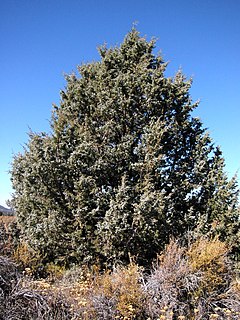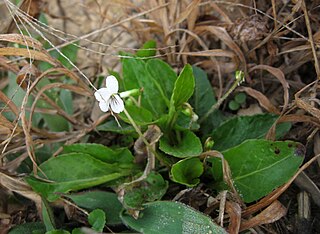
In Greek mythology, Anticlea or Anticlia was a queen of Ithaca as the wife of King Laërtes.

Events from the year 1778 in Canada.
The Pacific Bell Telephone Company is a telephone company that provides telephone service in California. The company is owned by AT&T through AT&T Teleholdings, and, though separate, is now marketed as “AT&T”. The company has been known by a number of names during which its service area has changed. The formal name of the company from the 1910s through the 1984 Bell System divestiture was The Pacific Telephone and Telegraph Company. As of 2002, the name “Pacific Bell” is no longer used in marketing, Pacific Bell is still the holder of record for the infrastructure of cables and fiber through much of California.

Melanthieae is a tribe of flowering plants within the family Melanthiaceae. Molecular phylogenetic studies in the 21st century have resulted in a large-scale reassignment of many of its species to different genera; in particular the genus Zigadenus (deathcamases) has been restricted to a single species, Zigadenus glaberrimus. Plants contain alkaloids, making them unpalatable to grazing animals; many are very poisonous to both animals and humans.
Pacific Northwest Bell Telephone Company was an AT&T majority-owned Bell System company that provided local telecommunications services in Oregon, Washington, and northern Idaho. Pacific Northwest Bell Telephone Company was formed on July 1, 1961 when it was spun off from the Pacific Telephone and Telegraph Company. On January 1, 1984, Pacific Northwest Bell was split from AT&T as ordered in the settlement of United States v. AT&T and became a subsidiary of the newly formed Regional Bell Operating Company US WEST, Inc. Pacific Northwest Bell became defunct when US WEST consolidated its three main subsidiaries, forming US WEST Communications, Inc. on January 1, 1991. US WEST merged with Qwest Communications International Inc. in 2000, and the US WEST brand was replaced by the Qwest brand. Qwest Communications merged with Louisiana-based CenturyLink in 2011, and the Qwest brand was replaced by the CenturyLink brand.

The western larch is a species of larch native to the mountains of western North America ; in Canada in southeastern British Columbia and southwestern Alberta, and in the United States in eastern Washington, eastern Oregon, northern Idaho, and western Montana. It is the most productive of the three species of larch native to North America.

Juniperus occidentalis, known as the western juniper, is a shrub or tree native to the Western United States, growing in mountains at altitudes of 800–3,000 meters (2,600–9,800 ft) and rarely down to 100 m (330 ft). It is listed as Least Concern on the IUCN Red List because it is a widespread species with an increasing population.

The northern spotted owl is one of three spotted owl subspecies. A western North American bird in the family Strigidae, genus Strix, it is a medium-sized dark brown owl native to the Pacific Northwest. An important indicator species, the northern spotted owl remains threatened due to continued population decline from human-caused habitat destruction and competition with invasive species, its main competitor being the barred owl.
Qwest Corporation is a former Regional Bell Operating Company owned by Lumen Technologies. It was formerly named U S WEST Communications, Inc. from 1991 to 2000, and also formerly named Mountain States Telephone and Telegraph Company from 1911 to 1991. It includes the former operations of Malheur Bell, Northwestern Bell and Pacific Northwest Bell as well.

Anticlea is a genus of flowering plants in the family Melanthiaceae, tribe Melanthieae. Molecular phylogenetic studies in the 21st century have resulted in number of changes to placements within this tribe. Anticlea was long submerged into the genus Zigadenus; however its separate position has been confirmed. Some species were also moved from Stenanthium into Anticlea. Members of Anticlea may also be distinguished from other members of the former genus Zigadenus, the deathcamases, by the presence of narrow tepals with a single, conspicuous, bilobed gland. It also has a wider distribution, occurring in Asia and much of North and Central America, ranging south to Guatemala.

Stenanthium is a North American genus of flowering plants in the tribe Melanthieae of the family Melanthiaceae.

Zigadenus is a genus of flowering plants now containing only one species, Zigadenus glaberrimus, the sandbog death camas, found in the southeastern United States from Mississippi to Virginia. Around 20 species were formerly included in the genus, but have now been moved to other genera.

Colias occidentalis, the western sulphur or golden sulphur, is a butterfly in the family Pieridae found in North America. Its range includes the Pacific Northwest and parts of British Columbia.

Charaxes anticlea, the small flame-bordered charaxes, is a butterfly in the family Nymphalidae. It is found in Senegal, Guinea-Bissau, Guinea, Sierra Leone, Liberia, Ivory Coast, Ghana, Togo, Nigeria, Cameroon, Gabon, the Republic of the Congo, the Central African Republic, Angola, the Democratic Republic of the Congo, Uganda, Kenya, Tanzania and Zambia.

The western round-eared bat is a bat species found only on the Pacific coast of northwestern Ecuador.

Viola primulifolia, commonly called the primrose-leaf violet, is a species of flowering plant in the violet family. It is native to eastern North America, and possibly also to the Pacific Northwest. Its natural habitat is wet acidic areas that are usually at least semi-open.

The Iron Gate, or "the Western Gate", is one of the four principal Roman gates into the stari grad of Split that was once Diocletian's Palace. Originally a military gate from which troops entered the complex, the gate is the only one to have remained in continuous use to the present day.

Triantha occidentalis, the western false asphodel, is a species of carnivorous flowering plant in the family Tofieldiaceae. It is found in the Pacific Northwest.

Micranthes occidentalis, commonly known as western saxifrage, is a species of flowering plant native to North America..
















